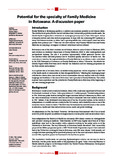Potential for the specialty of Family Medicine in Botswana: A discussion paper

View/
Date
2012-10Author
Parsons, Luise
Rijken, Taatske
Mbuka, Deogratias O.
Nkomazana, Oathokwa
Publisher
AOSIS OpenJournals, http://www.openjournals.net/Rights
Available under creative commons licenseType
Published ArticleMetadata
Show full item recordAbstract
Family Medicine is developing rapidly as a medical and academic specialty in sub-Saharan Africa.
The multifactorial policy drivers are not well described, but include population health needs, the
World Health Organisation’s initiative1 to re-energise primary care in their 2008 report, failure
of hospital services and even vertical programmes to cope with the continuing HIV epidemic in
many sub-Saharan countries in Africa, and a growing middle class which expects more and better
quality from primary care.2,3 These are but a few reasons why Primary Health Care and Family
Medicine are enjoying a resurgence of interest, investment and recruitment.
Botswana is one of the latest countries in sub-Sahara Africa to open a School of Medicine (2009)
and establish an Academic Department of Family Medicine (2010) to offer undergraduate and
postgraduate training. The aim is to produce appropriately skilled generalist doctors who
can function within and lead primary care to transform quality and access to health care. The
curriculum is based on the regional definition of Family Medicine in an African context, articulated
in the 2010 Statement of Consensus on Family Medicine in Africa.4,5 However, the debate has
already begun within Botswana about whether this definition and our training programme are
too Euro-centric and academic.6
It is expected that in Southern Africa, accredited family physicians will be competent to meet 90%
of the health needs of communities in their designated districts.78 Meeting this challenging target
with doctors drawn from and rooted in local communities who are familiar with local culture,
language and traditions is the aim of Botswana’s new specialty of Family Medicine. This article
explores these aspirations and the potential for Family Medicine in Botswana at the beginning of
this new training programme.
